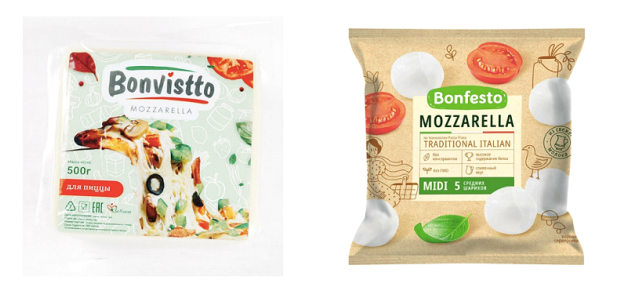Trademarks have a strong impact on consumers in the modern world. As a result, they have become the target of unfair competitors seeking to gain an advantage over other market players. One of the most common acts of unfair competition is the illegal use of a trademark by a competitor. Below is an overview of two recent unfair competition disputes in Belarus, in which trademarks became an apple of discord.
BONFESTO v BONVISSTO: dispute between cheesemakers
The dispute involved a dairy plant (‘the plant’) and a cheese manufacturer (‘the manufacturer’). It started when the plant became aware of the BONVISTTO-branded mozzarella cheese produced by the manufacturer, which was similar to the mozzarella cheese produced by the plant under the BONFESTO mark:

The plant had owned the BONFESTO trademark registration since 2014. The manufacturer was also the owner of the BONVISTTO trademark, registered in 2021.

In October 2021 the plant applied to the anti-monopoly authority. The plant initially referred to the anti-monopoly laws prohibiting unfair competition – in particular, the provisions related to the acquisition and use of the exclusive rights to trademarks.
During the examination of the case, it was established that the manufacturer had legally obtained the exclusive rights to use the BONVISSTO trademark. Therefore, unfair competition under these provisions was excluded.
This did not stop the case, however. The anti-monopoly authority analysed the possibility of applying other anti-monopoly provisions prohibiting unfair competition – in particular, through copying or imitating the packaging of the cheese products.
After an investigation lasting a year, the anti-monopoly authority found that the manufacturer’s actions did not constitute unfair competition. A sociological survey conducted during the investigation showed that the vast majority of respondents did not see the similarity between the packaging of the Bonfesto and Bonvissto products. In addition, according to the respondents, it was impossible to confuse these products.
Unfair competition following trademark registration
This unfair competition dispute took place in the veterinary products market. The parties to the conflict were two veterinary products suppliers from Belarus: Company A and Company B.
Company A, which sells veterinary products including Metrostim-Bel, }led an unfair competition claim with the anti-monopoly authority against Company B.
Upon review of the claim, the following was found:
- Company B is the owner of the marketing authorisation for the veterinary product Metrostim-Bel in Belarus.
- Company B registered the trademark depicted below, while the product under the name Metrostim had already been produced and known in the CIS and Baltic countries for some time.

- After registration of the trademark, Company B sent a cease-and-desist letter to Company A to stop the illegal use of the Metrostim-Bel designation, withdraw the products from circulation, destroy all counterfeit goods, labels and packaging of Metrostim-Bel products, and pay compensation for illegal trademark use. In addition, Company B also sent an application to the police with a request to conduct an inspection in relation to Company A.
The anti-monopoly authority decided that the actions of Company B did constitute unfair competition. Such actions were found to be illegal and aimed at obtaining a business advantage. According to the anti-monopoly authority, Company B intended to eliminate a competitor, and features of unfair competition were identified in terms of acquiring and using the exclusive rights to a trademark.
This article first appeared on WTR Daily, part of World Trademark Review, in October. For further information, please go to www.worldtrademarkreview.com.


